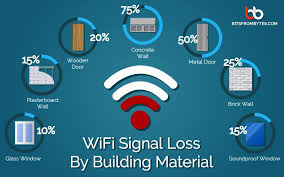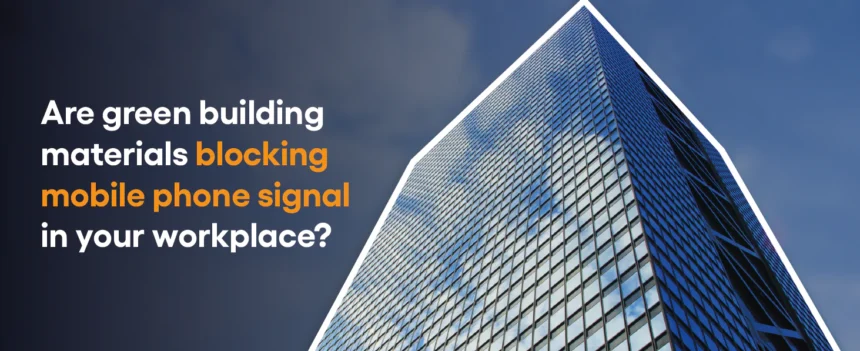A radio signal inevitably loses power even in empty space, but the main test for it is various physical obstacles. Walls and partitions, floors, and even glass lead to attenuation of the mobile signal. To solve problems with poor signal, people use cell signal booster for apartment, houses, warehouses, and any other premises. In this article, you will learn about the most insidious materials that interfere with the passage of a mobile signal, as well as the features of boosters.
What Factors Affect Mobile Signal Attenuation?
Mobile signal loss is one of the most common problems faced by users, especially in remote areas and inside buildings. When analyzing the causes of mobile signal attenuation, you should pay attention to the following factors:
- Type of building material. Different materials interact with radio waves differently. While some materials transmit the signal, others almost completely reflect it. This is why buildings lined with metal (sandwich panels) usually lack mobile communications. It should also be taken into account that the permeability of building materials deteriorates when they get wet.
- Thickness of the obstacle. Obviously, the thicker the layer of material through which the signal penetrates, the higher the power loss. Therefore, when building a house, choosing an office space, or in other situations where a high-quality mobile signal is important, you should consider whether the obstacle is of standard thickness or increased (for example, double brickwork).
- Signal frequency. Low frequencies overcome obstacles more easily than high frequencies. Often, regular FM radio works without problems whereas mobile and WiFi have problems. The greatest problems are experienced by WiFi networks at a frequency of 5 GHz and 5G mobile networks. But even within the popular 3G/4G mobile bands (from 700 to 2700 MHz) there is a strong difference in penetration.
Signal Blocking Materials

Various attenuation values for building materials can be found in the research literature. The given values do not always coincide. Differences in measurements may be associated both with the testing methodology and with the specific types of building materials that were used. In general, you can focus on the following data:
Glass And Glass Windows
Most studies note that regular glass and fiberglass have minimal impact on signal transmission. Depending on the frequency and thickness of the glass, the attenuation is usually quoted in the range of 0.5–3 dB. The situation, however, changes if the glass is coated with a solar control coating. Window sashes, metal frames, and reinforced glass significantly reduce power. Some types of low-energy glass (Low-E) can attenuate the signal by 24 dB or more.
Wood, Plywood, And Drywall
Wooden walls and partitions made of plywood and plasterboard are also materials that transmit radio waves quite easily. Although they do not have complete radio transparency, they do not usually lead to fatal attenuation of mobile communications or WiFi. Typical values for these types of materials are indicated in the range of 3–6 dB, less often – up to 10 dB.
Brick Walls And Masonry
Brickwork can seriously challenge mobile signal transmission, reducing signal strength by 15 to 20 dB. Of course, if brick is used only as a facing material in conjunction with wall stone or concrete, then losses will increase significantly.
Concrete And Reinforced Concrete Walls/Floors
Concrete is a real enemy of radio signals, especially high-frequency ones (such as 5 GHz WiFi). Losses in a 100 mm concrete layer can reach 25 dB and with a thickness of 200 mm increase to 55 dB. Reinforced concrete shows similar results, having an extremely negative impact on the quality of the transmitted signal. Typically, load-bearing concrete walls are the main cause of signal attenuation in urban houses.
Metal Cladding And Sandwich Panels
Perhaps the worst influence on the operation of radio communications is caused by metal cladding. Frame buildings based on sandwich panels transmit radio waves very poorly, often completely blocking mobile communications and WiFi. In such rooms, signal attenuation exceeds 50-60 dB.
How to Deal With Mobile Signal Attenuation?
Overcoming the attenuation of some materials is quite difficult, so most cell signal repeaters for apartments and houses are designed to avoid obstacles.
The outdoor antenna transmits the original (attenuated) signal to the device, the power of which is increased using a set of built-in amplifiers. After amplification, the signal is broadcast indoors using an indoor antenna. There are no restrictions on the number of users. The repeater works symmetrically in the direction of subscribers and the operator, also increasing the signal strength of smartphones towards the cell tower.
The repeater cannot function without connected antennas (outdoor and indoor). In this case, for correct operation, the two antennas must be separated by a sufficient distance to provide the necessary isolation. Failure to comply with this rule can lead to an amplifier’s overload and even a mobile network disruption. Once installed and configured, the repeater does not require maintenance.
A repeater is the only way to ensure stable communication between all operators throughout the entire premises. After installing the repeater, subscribers can use their devices and SIM cards. Using a repeater, it is possible to strengthen individual mobile standards (for example, GSM or 3G) or all standards at once (GSM/3G/4G/5G). For the repeater, it does not matter what you are going to use (the Internet or calls) since it simply reproduces the original signal of the operator.
Pros:
- Strengthening both calls and mobile Internet.
- The operation of the repeater is invisible to end users. Subscribers continue to use their devices and SIM cards.
- Communication amplification occurs over the entire area of the room (it is possible to scale the amplification system for large buildings).
Cons:
- Equipment to strengthen all communication standards and all operators can be expensive.
- To select equipment, you may need to call specialists to perform radio measurements and draw up an amplification project.
- Installation and configuration of equipment is more complex than other amplifier options.
- Internet speed is lower compared to directly connecting an outdoor antenna to a modem or LTE router.
Final Thoughts
Boosters can be an effective solution for improving mobile signal quality in apartments and houses with materials that impede signal transmission. However, it is important to choose and install the repeater correctly, taking into account the characteristics of the building and the signal level outside. For this, it is best to turn to professionals. UCtel is a reliable company that provides services to improve the mobile signal of popular British operators, including Tesco, Vodafone, Three, and others.
Read also following Treeleftbig.Shop








